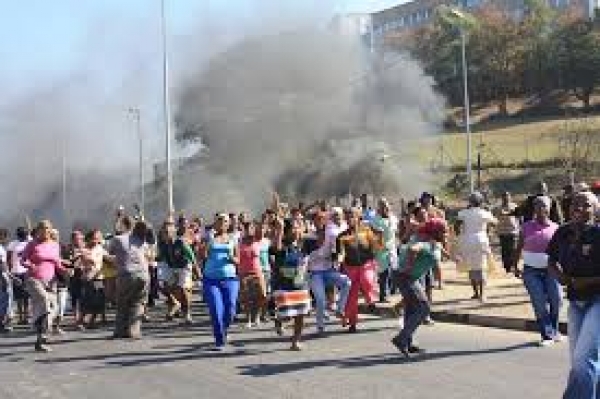Cato Manor’s struggle against state repression

Cato Manor has a long history of struggle and repression. Women have often been in the forefront of these struggles. This history is well known in Durban. Many families from KwaMashu have roots in Cato Manor. KwaMashu was created to house some of the people forcibly removed from Cato Manor under the Group Areas Act. They were taken from land in the city where they had some autonomy and moved out of the city to a segregated township under strict control of the apartheid state.
Cato Manor has a long history of struggle and repression. Women have often been in the forefront of these struggles. This history is well known in Durban. Many families from KwaMashu have roots in Cato Manor. KwaMashu was created to house some of the people forcibly removed from Cato Manor under the Group Areas Act. They were taken from land in the city where they had some autonomy and moved out of the city to a segregated township under strict control of the apartheid state.
After the 1994 elections many people were relieved, believing that the struggle for land and equality was over. It was thought that there was no further need for struggle because the ANC won the elections and it was part and parcel of the struggle. We thought that those who had lost land through colonialism and apartheid would get their land back since that was the first priority in the struggle. We thought that the cities would be open to all.
Government introduced the RDP, which did not only speak about houses. It was much broader than that. That programme was abandoned. But we still have RDP houses. They are small, badly made and often, just like the townships built during apartheid, far from the cities. They are an insult to the dignity of the people. But once who have an RDP you know that you will no longer be at risk of eviction.
Since the RDP houses began being built in Cato Crest, which is part of Cato Manor, the system has flowed with corruption and mis-allocations. Comrades of the ANC at eThekwini are making business out of our impoverishment. These houses are supposed to be free and they are supposed to be allocated on the basis of need. But to get an RDP you either need to be an ANC member or you must afford a certain amount of money to buy an RDP house. As I speak today the ward counselor Mzi Ngiba is renting his RDP house rather than giving it to people in need.*
Through the same corruption and mis-allocation in January 2013 more than 4,000 people were evicted. When we asked for alternative accommodation we were told that we must go back to where we came from or find our own place because we don’t belong in Cato Crest. This was amazing because we have lived in the area for more than seven years, some of us have been here for 15 years.
But we were very clear that it is not for the ANC to tell us what to do because its leaders were trying to save the status quo whereby people who pay for houses pay their money up front even before the space is opened. We exposed corruption and occupied the piece of land parallel to the development. All we faced there was repression, murder and evictions. We had to apply all forms of strategies including road blockades, a sit-in at the Department of Human Settlements offices and applications for legal marches. We have asked Nomsa Dube (Kwazulu-Natal MEC for Co-operative Governance and Traditional Affairs) to intervene in the area but she ignored us. We asked for Nathi Mthethwa (former national police minister) to arrest the assassins but he also ignored us. We had no choice but to believe in one another’s strength and to resist evictions, to use physical fights in confrontation with the police and land invasion unit, which resulted in our member Nkosinathi Mngomezulu being shot four times in the stomach. Comrades have lost blood and been hospitalized in the struggle. The lessons I learned here is that in 1994 we did not win this country. We only changed the faces of our rulers from white people to black people but the state still represses us. We have seen this with the Marikana massacre and with Nkandla.
It is a real shame that the leaders of our country are leading us towards worsening rather than changing the situation of poverty and inequality. We cannot trust the government. We have to return to struggle. The poor and the working class need to unite to form a powerful force that can bring the state under the control of the people, and use the state to break the power of capitalism over our lives. Land, wealth and power must be shared fairly and equally.
Ndabo Mzimela is the chairperson of Abahlali baseMjondolo in Cato Crest.
*GroundUp confirmed with Councillor Mzi Ngiba that he owns an RDP house in Cato Crest and that he rents it out. He said that he started doing this after he was intimidated out of it a few years ago. We contacted two lawyers to determine whether it is legal to rent out an RDP house but we got conflicting opinions. Views expressed in the article are not necessarily GroundUp’s.
Support independent journalism
Donate using Payfast

Don't miss out on the latest news
We respect your privacy, and promise we won't spam you.
Next: Some of SA’s top companies are quietly breaking the law
Previous: How poverty interferes with dreams: Andiswa Nkuphe’s story

This article is licensed under a Creative Commons Attribution-NoDerivatives 4.0 International License.
